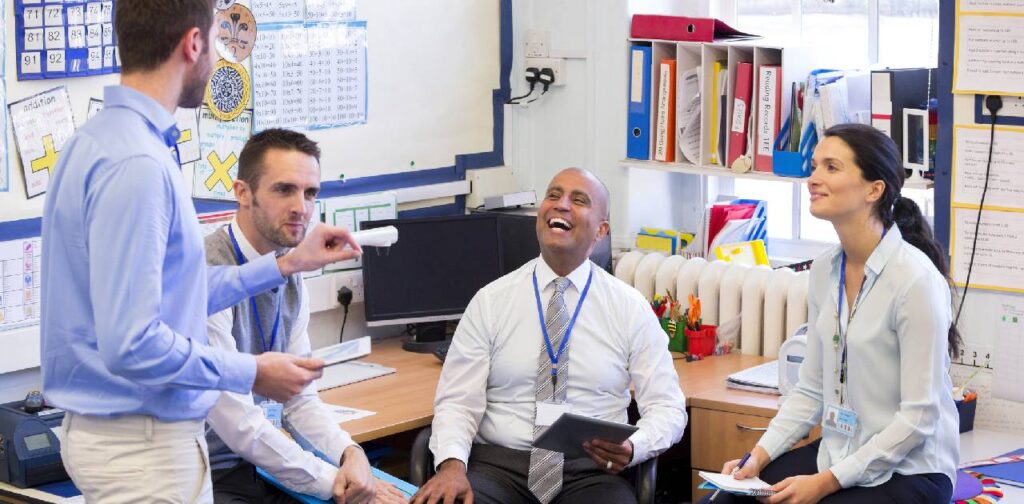With the new school year just around the corner, as a teacher you’ll want to be ready for whatever it throws at you. There’s a lot to think about from new pupils creating lesson plans, and targets for your own personal and professional development all need to be considered! As tempting as it might be to leave it all until the last week of the summer break, the future you isn’t going to thank you in September.
Nobody wants to start the new school year feeling behind and overwhelmed, even the teachers! That’s why we’ve put together this guide.
We want to help you get ahead of the game and set up your classroom for a successful school year. So, let’s dive into how you can get prepped and ready for this academic year.
What are the Best Ways Teachers can Prepare for the New School Year?
After enjoying the summer break, it's time to get ready for when school starts in September and the new students arrive. Here are our top tips for getting the next school year off to the best start:
1. Take Time for Reflection and Look Back on the Past Year
Reflecting on the previous school year can help identify areas for improvement and set goals for the new academic year. Try conducting a self-assessment of your teaching methods, considering feedback from students and colleagues. Based on these insights, you can set clear goals for your own career development and devise strategies to enhance your teaching practices and student outcomes in the coming year.
2. Set Realistic Expectations
Setting realistic goals and priorities is key to managing your workload and keeping a healthy work-life balance. Start by pinpointing areas where you can improve and come up with strategies to tackle them.
Make good use of technology to stay organised and focused, giving you the tools you need to streamline your tasks. Prioritise your activities, focusing on the most important areas for improvement first.
Don’t forget to leave some room in your plans for flexibility and adaptability, so you can easily handle any unexpected changes or challenges.
3. Create a Positive Learning Environment
Create a positive and welcoming classroom environment by using visual aids and decorations to stimulate and engage students. Implementing classroom jobs can help establish a routine and foster a sense of responsibility among students. Encourage participation and foster a sense of community and inclusivity among pupils.
Establish clear classroom procedures and communicate behavioural expectations and consequences effectively. Develop a routine for managing the classroom and transitions, and use visual reminders and charts to reinforce rules.
This structured approach promotes respect and responsibility, ensuring a productive and harmonious learning atmosphere.

4. Organise Classroom Tools and Resources
Organise classroom materials and resources so they’re easy to access. Use storage bins and labels to keep everything tidy and make it simple for students to find what they need.
Set up a clear system for managing student work and assignments, ensuring that both you and your students can keep track of progress.
Keep frequently used materials within easy reach to make daily activities run smoothly and efficiently. This approach not only saves time but also helps maintain a neat and organised learning environment.
5. Planning and Preparing Lessons
Plan engaging and interactive lessons and create lesson plans that fit the curriculum, using a mix of teaching strategies and plenty of technology. Keep your lesson plans fresh by reviewing and updating them regularly, and always encourage student participation and feedback to keep things lively.
Align your lessons with your goals and priorities, and use student data to create targeted plans. Embrace technology not just in your teaching, but also in planning and organising your resources.
Think ahead to make sure you have all the materials you need to support your teaching and help students succeed.
Mentally preparing for the first week of school
Make Sure the School Year Begins on a Positive Note
Planning ahead for the first week of school is key to setting a positive tone for the year. Prepare your classroom and resources in advance, and design engaging lessons to capture students’ interest early on.
Set up a classroom calendar and assign jobs to encourage student involvement, planning interactive activities for the first few weeks.
Stay flexible by anticipating unexpected events and being ready to adjust your plans. Use this time to build relationships with your students and establish a structured learning environment, encouraging participation from the start.
Incorporate technology to communicate with parents and keep them informed about student progress. Maintaining focus and organisation throughout the week will help maximise teaching time and reduce stress, laying a solid foundation for a successful academic year.
Classroom Rules and Routines
Establishing clear rules and routines for students to follow daily, setting expectations for behaviour and performance can make teaching life easier.
Many teachers find communicating these rules and routines clearly to a new class at the beginning of the new school year helps create a successful start for the new year, and these plans can be reviewed and revised as needed.
Incorporate classroom icebreaker activities to help pupils get to know each other and build a positive classroom environment.
Building Relationships and Focus on Communication
- Establishing clear rules and routines for students to follow daily, setting expectations for behaviour and performance can make teaching life easier.
- Many teachers find communicating these rules and routines clearly to a new class at the beginning of the new school year helps create a successful start for the new year, and these plans can be reviewed and revised as needed.
- Incorporate classroom icebreaker activities to help pupils get to know each other and build a positive classroom environment.
Connect with Colleagues and Parents
- Communicate with your peers and fellow teaching professionals in order to stay active, social, and up-to-date with any changes in school procedures.
- Attend staff meetings and professional development opportunities to stay informed and connected.
- Use technology to communicate with parents and keep them informed about student progress.
Get to Know Your Students
- Find out as much as you can about your pupils so that you are aware of any requirements or needs and the best way to communicate with the class.
- Think of some fun and different icebreaker activities to discover more about the class and things they have in common, or unique traits and facts, for example, a birthday chart.
- Create opportunities to get to know your pupils and ease some of the pressure of meeting new people and getting used to a new environment and school year.
During the summer holidays, prioritise rest and relaxation before diving into new school year preparations. Focus on your mental health and well-being through self-care activities like exercise, meditation, or hobbies to manage stress and maintain a healthy work-life balance.
When you’re ready to plan, use technology to stay organised and focused. Take time to reflect on past experiences, identifying areas for improvement and developing strategies to address them.
This balanced approach will help you start the new academic year refreshed and well-prepared.
Check in frequently with experienced colleagues – how do they get themselves ready?
Lastly, plan something nice for the first weekend. This will act as a target and reward after the first week back. Something like a cinema trip is ideal – a very ‘heavy’ weekend probably is best avoided as you‘ll be pretty exhausted and will be wanting to conserve some strength for the coming weeks!
Good luck!
Why not check out our latest teaching and education roles, we recruit for a variety of role on both permanent and short term contracts, click here to find out more


